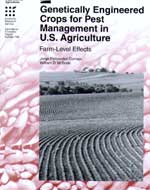Genetically Engineered Crops for Pest Management in U.S. Agriculture
by
Jorge Fernandez-Cornejo,
William McBride, Cassandra Klotz-Ingram, Sharon Jans, and Nora Brooks
Agricultural Economic Report No. (AER-786) 28 pp, May 2000
 Adoption of genetically engineered crops with traits for pest management has risen dramatically since their commercial introduction in the mid-1990's. The farm-level impacts of such crops on pesticide use, yields, and net returns vary with the crop and technology examined. Adoption of herbicide-tolerant cotton led to significant increases in yields and net returns, but was not associated with significant changes in herbicide use. On the other hand, increases in adoption of herbicide-tolerant soybeans led to small but significant increases in yields, no changes in net returns, and significant decreases in herbicide use. Adoption of Bt cotton in the Southeast significantly increased yields and net returns and significantly reduced insecticide use.
Adoption of genetically engineered crops with traits for pest management has risen dramatically since their commercial introduction in the mid-1990's. The farm-level impacts of such crops on pesticide use, yields, and net returns vary with the crop and technology examined. Adoption of herbicide-tolerant cotton led to significant increases in yields and net returns, but was not associated with significant changes in herbicide use. On the other hand, increases in adoption of herbicide-tolerant soybeans led to small but significant increases in yields, no changes in net returns, and significant decreases in herbicide use. Adoption of Bt cotton in the Southeast significantly increased yields and net returns and significantly reduced insecticide use.
Keywords: Biotechnology, genetic engineering, pest management, field crops, input traits
In this publication...
- Frontmatter (Title page, Contents, Summary),
 24 kb
24 kb
- Introduction,
 41 kb
41 kb
- Background,
 36 kb
36 kb
- Data and Methods,
 2,904 kb
2,904 kb
- Adoption of Genetically Engineered Crops,
 59 kb
59 kb
- Farm-Level Effects of Adoption,
 31 kb
31 kb
- Concluding Comments,
 16 kb
16 kb
- References,
 35 kb
35 kb
- Entire report,
 3,141 kb
3,141 kb
Need help with PDFs?
Order this Publication